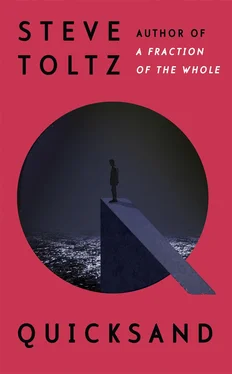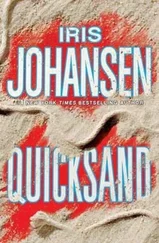Why? What were you afraid of?
My clairvoyance wasn’t clairvoyance, but a narrative vision. I believed I was getting the hang of fate’s dramatic structure, and that it had in store something unpleasant in relation to these prostitutes from The Enigma Variations.
And did it? Something happened?
Not, it turned out, in relation to the women at all. One night I arrived at room 707 with a plate of chicken fettuccine balanced on the palm of my left hand and knocked on the door with the shame that comes from pushing a product that costs triple its value. A black shoe had the door propped open. I sang out, ‘Hello?’ and ‘Room service!’ and ‘Knock knock?’ and ‘Should I come in?’ and ‘Here I come!’ and I pushed my way in, bracing myself for verbal abuse (guests were always annoyed at your presence in their rooms, as if by bringing them food you somehow cheapened their hunger). Near the open minibar, the curtains were drawn over the thick unopenable windows and a strange, gummy odour made me wince. On the tufted aquamarine carpet, peanut shells and tiny vodka bottles were scattered amongst several soaking wet towels. A chair was tipped over. And then — him!
Who?
A stark-naked middle-aged man hung by the neck from the surprisingly sturdy chromium-plated chandelier.
A suicide!
He ordered room service right before doing it. Fucker. Eternally slumbering broken-necked bastard! Of course I thought about Henry. And his suicide. And how he had also orchestrated to be found by a stranger. Only now I was the stranger.
For the record, the suspect is referring to his father, Henry Benjamin, who hired a housekeeper in order to —
A Portuguese woman named Dulce, who entered the house when Veronica and I were at school and Leila was at an audition. A note from my father was lying on the table. ‘Please clean the upstairs bathroom first.’ She clomped upstairs and found Henry dead in the bath with his wrists slit. ‘Usually the method of teenage girls,’ and ‘An unmanly suicide,’ I later overheard his brothers whisper at his wake, but the overall consensus was that one has to respect a man unwilling to burden his family with the memory of having found his body.
Especially considerate if one discounts poor Dulce.
She came to the door a week after the funeral shaking and pouring sweat. ‘I was never paid for my day of work,’ she said. Leila answered, ‘Well, you didn’t actually clean anything.’
Hence Aldo’s expression for whenever he is walking slowly into what he perceives to be a bad situation. He calls it walking like a Portuguese housekeeper.
Your superiors won’t get it.
So, the suicide in the hotel …
I looked for a note. There wasn’t one. Only a breakfast card filled out for the following morning: OJ, decaffeinated coffee, continental breakfast basket. I sat down on the bed and tried not to look at the dead man whose expression recalled an umbrella blown open by the wind. From his combination-lock leather attaché and smooth black shoes and neatly folded double-breasted suit I deduced this suicide case had had a business implosion, probably lost the family home, couldn’t face his wife and kids. The body twisted on the curtain cord and his sad sightless visage was angled mercifully away from me. I sat at the desk and wrote a note for him on hotel stationery and left it under a puddle of yellow lamplight: ‘Dear World,’ I wrote, ‘please have my body placed in a giant clamshell and lowered to the sea floor.’
I read about that in the paper!
Liam, I’m telling you, this was a game-changer. Besides feeling upset and horrified, I was overwhelmingly envious; this motherfucker had achieved something that I, who only ever wanted to vanish or dissolve by an act of will or to liquefy in my sleep or disintegrate body and soul, and who occasionally on dark nights toyed with fantasies of autoerotic asphyxiation, had not. It was at that moment I knew I would not quit the Railway Hotel, not in any verbal or written sense, but that I would never turn up again. More significantly, I knew I was done and dusted with it.
Done and dusted with what?
You know how when I was younger I wanted to live at least as long as an Antarctic sponge?
Fifteen hundred years.
It’s not just baby Ruby’s death and the divorce and losing friends and the business failures and suffocating debt, it’s the little things: the abscessed tooth that only presents itself while you’re camping, the snakebite when out of cellular range. Listen. I don’t know if you know this, but my mother’s father died after he was bitten by a nonvenomous spider — he died of fright. My mother’s mother was killed by a misdiagnosis of cancer, suggesting a genetic strain of suggestibility off the fucking charts. You know how Jung said the fear of being eaten and the fear of the dark are in the collective unconscious? Well, I come from a very specific line that passed on very specific fears from generation to generation: fear of unravelling rope bridges, fear of causing an avalanche by sneezing, fear of accidentally procreating with a half-sister, fear of being shot in the face by a hunter —
Leila’s island.
What about it?
I know you too well. You’re about to talk about Leila’s island again.
They haven’t heard it.
It’s not relevant.
It might be.
It’s not, though.
I’m going to say it.
I’ll say it quicker. For the record, Aldo’s mother, Leila, and her family came from a small Pacific island, the name of which Aldo refuses to utter aloud because he promised himself that once it had been totally submerged he’d forget it for all time. When Aldo was thirteen years old, the highest peak of its tallest mountain was swallowed by the sea; Aldo’s father Henry chartered a private twelve-seater and flew him and his mother and his sister over Leila’s homeland for the last time. There. That’s it.
No, that’s not it. The plane schlepping us across the gleaming Pacific was terrifyingly small, the main cabin had patterned curtains on the oval windows and smelled of new carpet and salted peanuts. There was dog hair on the seat. I asked to see the pilot’s licence and was upset he couldn’t produce it. To everyone’s laughter, I pulled out of my Adidas sports bag an unused World War II parachute and my nana’s spare oxygen tank, and thirty minutes into the flight, the plane began to shudder, and they laughed even harder when I put the mask over my face, as if they didn’t notice the building rhythm of the sudden drops. Both Veronica and Henry were frozen upright in their seats, and I remember wishing I was in the plane alone. I imagined the crash and resented the presence of Veronica — who I had fallen out with permanently the day she hit puberty. Ever since, we’d argued constantly, slapped nicotine patches on each other while we slept etc., and I decided it would be irksome to die with her. There was a moment when the plane cruised as if on a current of air. ‘That’s it! That’s it!’ Leila screamed. I closed my eyes, not from fear, but because Henry’s gift to Leila of witnessing the vanishing of her homeland as it vanished seemed such an outlandish privilege that I was determined not to experience it. Leila cried out, ‘Aldo, please look out the window.’ I looked. The sun had dipped behind low moist clouds and there, veiled in a light rain, was the land that sprang out of my mother’s dreams — a barely visible, pitiful, water-bound peak surrounded by a colossal turquoise sea. The tip of an island so minuscule it seemed impossible that any human civilisation once resided there. This was the image she would brood on until her final breath. ‘It’s sad, but nothing more,’ I said, as the early moon floated above the vast calm that enveloped the doomed island. I wasn’t saying that it wasn’t sad. The pilot had turned the plane to make a second pass when there was an eerie, discomforting quiet, a faint acrid smell and a haze of flickering smoke, and the dim luminosity of silver sparks hitting the windscreen; the plane laboured and reverberated and then dropped, and we went into a steep descent. It was as if I were levitating in my seat; there was enormous pressure in my eardrums and everyone screamed and, a moment later, lost consciousness, their heads slumped on their chests. All except me, sucking on my nana’s oxygen, my face crushed against the window. The pilot managed to get the plane under control but was flying radically low, and I saw through that oval window an image that penetrated my subconscious with such force I can still feel its moment of entry: the water rising up like blue flames and utterly submerging the drenched peak. That was it: the whole nation slipped away in broad daylight. I was a spectator with no real business seeing what I was seeing. How many generations had lived and died here! I was a solitary pair of eyes, and maybe the ghosts of that nation, unfortunate spirits with nobody to haunt for miles around, attached themselves to me, a diffident eyewitness unwittingly administering a nation’s last rites, because it was just after this incident that life turned to shit. Veronica in the bus explosion, and, the year before that, Henry breaking his shoulder in a fall down a flight of stairs. In hospital he contracted an infection at the surgical site, necrotising fasciitis, that led to septic shock and forced him into and out of surgery, and into the chronic pain that, I believe, led to his suicide. The one he orchestrated for a stranger to find, just as I had been conscripted to do in the Railway Hotel.
Читать дальше











